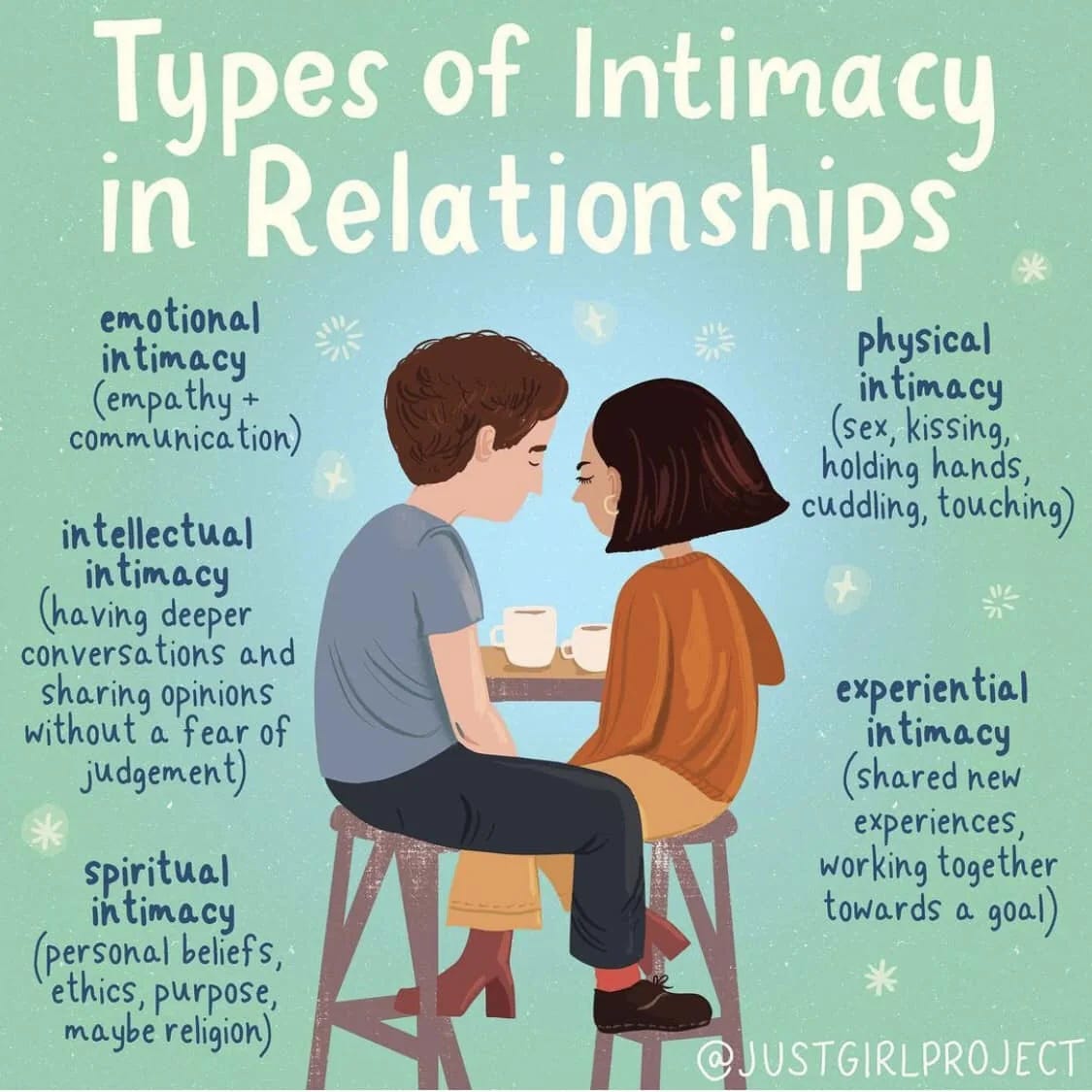Five Types of Intimacy
Harnessing each type of intimacy to foster meaningful connections with important people in your life is key to increasing joy and reducing loneliness and stagnation.
Intimacy is a crucial element of strong, sustainable relationships. It helps us feel safe, protected, secure, and loved.
People often assume that intimacy only exists in the context of romantic and sexual relationships, but there are actually five types of intimacy. All of them are essential to feeling fulfilled in our social connections, and helping us to access higher feelings of satisfaction, joy, and stronger mental and physical health.
Physical intimacy includes physical touch (both sexual and non-sexual) such as intercourse, kissing, hugs, cuddling, sitting close together, or holding hands.
Emotional intimacy involves the honest sharing of your thoughts, feelings, fears, hopes, and/or dreams, and feeling heard and understood by another person.
Intellectual intimacy involves communicating beliefs, viewpoints, and ideas in a way that creates intellectual stimulation, curiosity, interest, and acceptance (despite possibly differing vantage points).
Experiential intimacy involves doing something together that creates a shared experience or allows teamwork towards a common goal.
Spiritual intimacy involves sharing moments that bring you a sense of awe, wonder, or acknowledgement with something bigger than yourself.
The next time you feel disconnected or lonely, ask yourself which type of intimacy you need the most, and connect with someone from your inner circle or another trusted person to meet this need—although it’s worth noting you don’t need one person to fulfill all five forms on their own.
Here are some ways you can address each type of intimacy with a friend, colleague or loved one:
To cultivate physical intimacy, start with a simple hug.
To cultivate emotional intimacy you might talk about your current struggles, share your self-development goals, or discuss something that happened in your childhood and how it shaped who you are as an adult.
To cultivate intellectual intimacy you can debate two sides of a hot topic, talk about the meaning of life, or discuss the themes of a movie you both watched.
To cultivate experiential intimacy you might volunteer work, train for a race together, learn a hobby, plan a trip, or play a video game or sport.
To cultivate spiritual intimacy you might pray together, meditate, enjoy a natural phenomenon together (like watching a sunrise), go on a hike, or talk about meaning and purpose in each of your lives.
Intimacy, or the degree of closeness between people, requires constant work, dedicated attention, and willingness to open up to, and put trust in others. But this effort is worthwhile - because it also brings you calm, joy, and the feeling of being part of something bigger than yourself.
BONUS TIP
Identify one important person in your life whom you’d like to improve relationship with. Rate your satisfaction with this relationship on a scale of 1-10 (10 being highest satisfaction). Then, for one week, commit to doing something each day to foster intimacy with this person in the areas you choose. For example, you can pick your best friend, and do something to build your intellectual intimacy with them on Monday, Wednesday and Friday, and something to grow your experiential intimacy with them on Tuesday, Thursday, Saturday and Sunday. At the end of the week, rate your satisfaction with this relationship again. Chances are, you’ll see this number improve significantly - which gives you more motivation to continue this work with them and others in your life.
If you found this helpful, please share this with a friend.
Cheers to your health,
Dr. Judy Ho
Pre-Order here: https://bit.ly/3MvuvvF
About me:
Dr. Judy Ho, Ph. D., ABPP, ABPdN is a triple board certified and licensed Clinical and Forensic Neuropsychologist, a tenured Associate Professor at Pepperdine University, television and podcast host, and author of Stop Self-Sabotage. An avid researcher and a two-time recipient of the National Institute of Mental Health Services Research Award, Dr. Judy maintains a private practice where she specializes in comprehensive neuropsychological evaluations and expert witness work. She is often called on by the media as an expert psychologist and is also a sought after public speaker for universities, businesses, and organizations.
Dr. Judy received her bachelor's degrees in Psychology and Business Administration from UC Berkeley, and her masters and doctorate from SDSU/UCSD Joint Doctoral Program in Clinical Psychology. She completed a National Institute of Mental Health sponsored fellowship at UCLA's Semel Institute.







